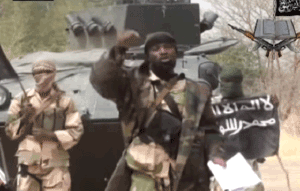Senior Correspondent, ISHAYA IBRAHIM, reports on Boko Haram’s continuous atrocious attacks and seeming helplessness of Nigeria’s security agencies…
It is still bloody as ever in the North Eastern corner of Nigeria. Boko Haram has become even more hardened, launching series of ferocious attacks, especially in Borno State, against civilians.
Boko Haram leader, Abubakar Shekau, with Amoured Personnel Carrier
On Tuesday, last week, a suicide bomber detonated an improvised explosive device (IED) at the popular Maiduguri Monday Market, killing more than 30 persons and injuring 69 others. The Maiduguri explosion affected mostly petty traders and members of the youth vigilante group, popularly called Civilian JTF, who were supposed to be securing the area.
Three days earlier, the militants had attacked four villages near Chibok, the area where it abducted over 200 girls on April 14. In the attack, it bombed a church and killed scores of worshippers. The bodies of at least 40 civilians and six militants were recovered, British Broadcasting Corporation (BBC) quoted a local vigilante operative in the area as saying.
Hundreds of villagers had been killed in similar attacks. Incidentally, many of such killings go unreported, except for a few, like the attack on Alagarno, a village near Chibok, on May 21 where witnesses said the militants spent hours killing and looting without a response from the Nigerian military.
On the same day, there was also the attack in Ashigashiya and Chinene villages, both in Gwoza local government area of Borno State, where scores of villagers were killed, after which the terrorist group hoisted its flags, though the Nigerian Army swiftly regained the villages.
Some residents of Gwoza, a hilly community in Borno State, told TheNiche that several attacks in their area go unreported. One of the residents cynically told this medium that the federal government no longer considers them part of Nigeria, the major reason he said their villages are without security operatives, save for the main town where there are pockets of checkpoints.
The resident, who pleaded anonymity, added that the insurgents enjoy a field day in Gwoza villages, abducting women and conscripting young men. For those it has no use for, the resident said, it kills at will.
Even as the schoolgirls abducted in a government secondary school in Chibok have not been rescued, Boko Haram has continued a kidnapping streak. On June 5, members of the sect reportedly kidnapped 20 women from a nomadic settlement called Rigan Fulani, a town near Chibok.
Alhaji Tar, a member of the Civilian JTF in the area, told newsmen that the militants arrived at noon and forced the women to enter their vehicles.
“We tried to go after them when the news got to us about three hours later, but the vehicles we had could not go far, and the report came to us a bit late,” he said.
The unceasing attacks of Boko Haram got a security expert and a retired commissioner of police, Frank Odita, wondering what has gone wrong with the state of emergency the military is supposed to be enforcing.
“The question I want to ask those who are in charge of our security is: how is it possible for these people to be having a field day in a state of emergency where the military should have 10 to 15 metres checkpoint at every nook and cranny? They (Boko Haram) come and abduct women; they kill people every day, and our military is not responding.
“We have not been told the casualty figure they (Boko Haram) have suffered as result of encounter with our military. If they (military) are killing them, I am sure Boko Haram will not be coming. They (insurgents) just come and go, carry girls, carry food, now they are carrying women. We don’t know what they will carry next. It is becoming embarrassing,” Oditta said.
The sect has also been making steady incursions into the Federal Capital territory (FCT), Abuja. In the last two months, its operatives have killed an estimated 114 people. The killings have increased fear among residents of the FCT. Majority of the residents now avoid public places such as recreational parks, gardens, drinking spots, markets, shopping malls and other social centres.
Abuja was first assaulted this year on April 14 when terrorists detonated bombs at the high density Nyanya Motor Park that claimed over 75 lives. At the same Nyanya, another bombing sent over 19 people to their untimely graves on May 1. The latest attack which occurred on June 25 at the Emab Plaza, along Aminu Kano Crescent in Abuja, claimed at least 20 lives.
Despite government’s assurances and re-assurances to make the country safe, it is still business-as-usual and bloody as ever, apprehensive Nigerians have noted.











